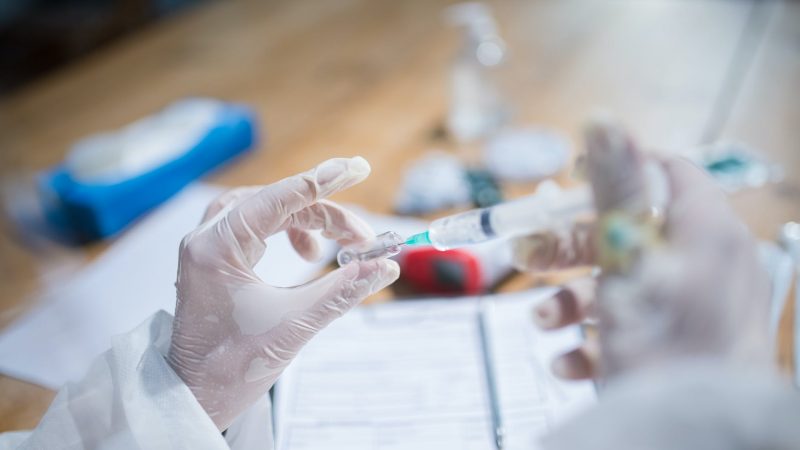'I urge my generation to be more like me: have your sleeve rolled up, your arm ready to be jabbed.'

The government has recently announced that young people who are nearly 18 will now be offered the jab, and it soon hopes to roll out the vaccine to younger age groups.
The sentiment of ‘better late than never’ applies here — it’s fantastic to see that young people will finally get the opportunity to get on with their lives because since the start of the pandemic young people’s lives have been put on hold.
My generation is notoriously categorised as ‘generation Covid’; it is infallible, we have suffered a lot: the loss of education, the exams fiasco, the chaotic situation at universities, combined with the impact on family finances and mental health, mean that many young people have suffered immensely since the start of this pandemic, and face even more challenges ahead.
That is why I unequivocally will be having the vaccine as soon as the opportunity arises. My sleeve is rolled up, arm ready to be jabbed.
But worryingly, not all my friends are as enthusiastic to have the vaccine. Some 14% of 16-17-year-olds reported vaccine hesitancy when surveyed by the Office for National Statistics (ONS) between May and June.
Due to the pandemic, many of the conversations that I have had with my friends have been over social media and there is a constant pattern emerging among my age group of young people who are reluctant to have the vaccine. There are three main reasons why young people are dubious to have the vaccine: young people have worries over safety, the misinformation spread over social media has inevitably contributed to vaccine hesitancy, and the belief that young people don’t have to be vaccinated as they are less likely to be ill with covid has played a part too.
Firstly, the vaccine is completely safe, and many celebrities, politicians and ordinary people alike have taken the vaccine.
The second problem is slightly more challenging. Misinformation is rife among social media. Useful Covid-19 information isn’t reaching GenZ, the Instagram and Snapchat generation; instead, young people are flooded with false conspiracy theories that permeates Instagram and Snapchat, perpetuated not by medical experts with verified social media accounts, but by trouble-makers intent on spreading misinformation.
Thirdly, young people argue they do not need to be vaccinated as they do not get seriously ill from COVID-19. However, being young and healthy doesn’t guarantee any natural immunity against COVID-19. Young people who catch the virus can still develop debilitating long-term symptoms. In addition, young people have died from COVID-19, including those who were completely healthy beforehand.
ONS statistics have also found that men are less likely to accept the vaccine than women, although nobody seems quite sure why. In my opinion, on Instagram, a lot of female influencers are posting pictures of themselves having the vaccine, and that probably explains why more women are having the vaccine in comparison to men. It is then fashionable for women to post pictures of themselves outside a vaccine centre because their inspiration has done it.
Unfortunately, men hardly have any inspirational figures promoting or encouraging them to have the vaccine – where are the footballers? Rappers? Clothing brands? If we see other men having the vaccine or a trend emerges of men having the vaccine, perhaps, vaccine hesitancy will decrease among men.
Initially, vaccine hesitancy was high among BAME communities, for much of the same reasons: lack of information, neglect and the spread of misinformation. Now young people are the new cohort who are reluctant to have a vaccine – just like many encouraged the BAME community to have the vaccine, we now must encourage young people to do the same.
Instead, the government is doing the polar opposite, there are reports saying that the prime minister is ‘raging’ at young people who are slow to get down to vaccination centres.
The government has also announced that vaccine passports will come into effect by the end of September as a way to incentivise jabs, and whilst I believe that vaccine passports are an infringement on our civil liberties and coercion is not the correct way to go about getting people vaccinated, I believe that young people are now left with no other realistic choice but to have the vaccine.
So, I urge my generation to be more like me: have your sleeve rolled up, your arm ready to be jabbed.
Qais Hussain is a 17-year-old A Level student and Labour Party member from West Yorkshire.
To reach hundreds of thousands of new readers and to make the biggest impact we can in the next general election, we need to grow our donor base substantially.
That's why in 2024, we are seeking to generate 150 additional regular donors to support Left Foot Forward's work.
We still need another 124 people to donate to hit the target. You can help. Donate today.



